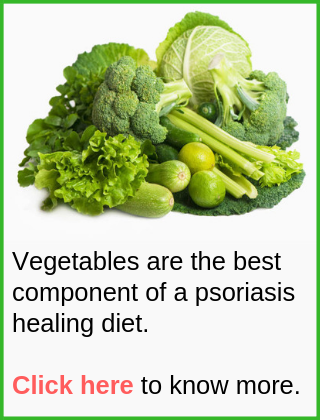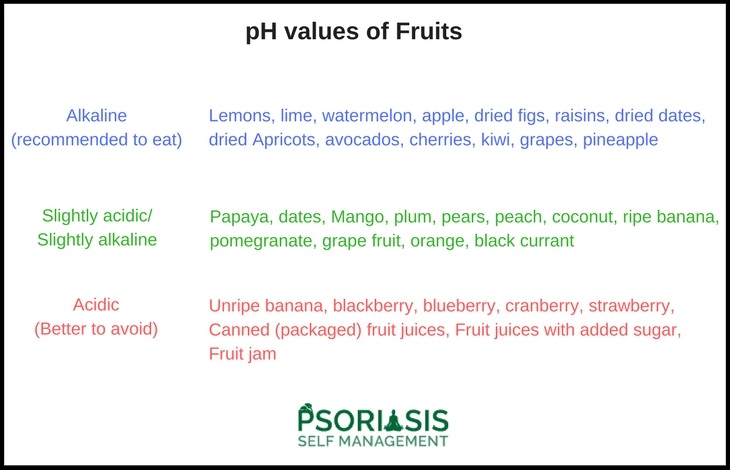Fresh vegetables and fruits are the most important ingredients of the psoriasis healing diet protocol. In terms of healing and nourishing properties, fruits come second only to vegetables- easy to digest, promotes body detox, provides micro nutrients, makes your body alkaline, tastes good and easily available. In our previous post, we have already discussed in detail about the benefits of vegetables for psoriasis in detail. Today, we would talk about fruits.
Fruits provide optimum nourishment without troubling the gut
Fruits, along with green veggies, are among the most nutrient-dense food stuffs around. Believe me, if you eat vegetables and fruits intelligently, you would never face the issues like no energy, lack of stamina and tiredness.
In general, people prefer grains, cereals and animal proteins over fruits and vegetables because they believe that more the carbohydrates and proteins, more would be the energy and strength. Hence, a diet based on vegetables and fruits seems an energy deficient food regimen- a less appealing idea. But, being a psoriatic person, we should be aware of the trace mineral and vitamins in vegetables and fruits, which are far easier to digest and absorb. Proteins, starches and fats provided by the grains and animal proteins take a lot of efforts to process and our already compromised gut would have a hard time absorbing the nutrients.
Fruits help to neutralize acidic body toxins
Hyper-acidic body pH plays a vital role in the worsening of psoriasis symptoms:
- Promotes the growth of Candida (yeast overgrowth) and unhealthy microbes in your gut to affect the immune system.
- Poor digestive health and worsening of leaky gut syndrome
- Decreases the level of oxygen in body cells to cause fatigue, stress and anxiety. Lack of oxygen affects the whole body metabolism.
- Weakening of hairs, nails and teeth by depleting the alkaline reserves in your body.
Unfortunately, most of the foods that we eat- animal proteins (meat, fish, eggs and milk), grains, white rice, bread, junk foods, bakeries, white sugar, tea, coffee, carbonated drinks, soda- are all acidic in nature. To reverse this situation, consume a lot of vegetables and fruits. Almost all the vegetables and many of the fruits are alkaline in nature. Hence, a diet based on vegetables and fruits would definitely help to maintain the desired acid-alkaline balance in the body.
- Generally ripened (sweet) fruits are alkaline in nature whereas unripened (sour) ones are acidic.
- Fruits under the category “Slightly acidic/Slightly alkaline” would not make your body acidic; hence, quite safe to eat.
- Always prefer freshly prepared fruit juices without added sugar over canned (packaged) fruit juices as they are highly acidic in nature.
In today’s modern world, our diet comprises mainly of proteins, starches (complex carbohydrates), fats and artificial sugars. Due to a compromised digestive health, our gut can’t process these foods properly which in turn would overload our body system with acidic body toxins (undigested food and unhealthy microbes). To relieve this burden, we should eat permitted vegetables and fruits in liberal quantities to emulsify, neutralize and eliminate these toxins.
Fruits eases bowel movements and promotes body detox
Fruits, along with vegetables are nature’s best constipation relieving remedies. Apples, papaya, guava, avocados, apricots, pears, plums and bananas- all these fruits would help in thorough evacuation as they contain both-water soluble and water insoluble fibers in good amounts. The skin of the fruits also adds bulk to the stool to stimulate peristalsis (muscles relaxation and contraction) for easy bowel movements. You can eat them raw or stewed. The fruits mainly used for stewing are apples, pears, peaches, figs, raisins and apricots.
In case of fruits with seeds such as figs, raisins, apples, guava, pomegranate and so on- the peristalsis is further stimulated by the mechanical action of seeds. That’s why water soaked raisins are my grandma’s favorite remedy for constipation.
The risk of over-consumption of fruits
We have been listening all through our lives that fruits are good for our health. Definitely, they are! But, there are some interesting facts about the over-consumption of fruits that everyone should know.
Fruits consumed in excess is less bothering if you eat them alone, without mixing with other foods. For example, if you eat fruits everyday as your breakfast- no breads, no milk, only fruits. No harm in that. Actually, it is beneficial because fruits provide easy to absorb vitamins, minerals, antioxidants, phytonutrients and dietary fibers. Also, fruits are quite filling and satisfying in nature and hence, it is very difficult to overeat them. They aid in cleansing of the intestinal tract and help in weight loss as well. Dr Pagano’s psoriasis healing protocol always start with a 3-day apple diet for internal body cleansing- you eat as many apples as you like for the whole 3 days without eating anything else. Only apples, a lot of drinking water and extra virgin olive oil at night for enhanced laxative effect.
The problem arises when you eat fruits in excess along with other foods– in that case, excess of natural sugar (from fruits) can store in your body in the form of fat which can overload the liver and congest it over a period of time.
Why is that? Let us find out?
Fruits contain two simple sugars- glucose and fructose. Glucose is readily metabolized by the cells to produce energy, whereas fructose takes time and efforts to metabolize. The human body uses glucose as the primary source of energy. The fructose burning takes time and it is usually stored in the liver for future energy requirements. In other words, glucose can be easily processed by the body cells, whereas fructose can only be processed by the liver only.
Now, if you eat fruits alone at a time, the liver would be almost forced to process the fructose to get energy. Hence, the storage of excess fructose in the form of fat would not take place. But, if you combine excess of fruits with other foods such as grains- then the body would quickly utilize glucose from fruits and grains for energy and leave fructose as it is in the liver unprocessed. It would result in storage of fructose in the form of fat. If such a practice continues for many days, gradually the overload of fats in the liver would lead to liver congestion and non-alcoholic fatty liver problem.
Well, don’t get disheartened. We don’t need to give up on our favorite fruits, rather we just need to become smart and follow the below tips.
Dr John Pagano’s recommendations- Fruits for Psoriasis
Dr John Pagano, author of the book Healing Psoriasis: The Natural Alternative is a pioneer in the field of holistic healing of psoriasis. Few of his recommendations about eating fruits for psoriasis healing are:
- The routine food stuffs- grains and animal proteins- should make up 20% of your diet. Remaining 80% should include permitted vegetables and fruits.
- People dealing with psoriatic arthritis and eczema should avoid citrus fruits, citrus fruits juices and strawberries. This rule is not applicable to lemons and Indian gooseberry (Amla). In fact, lemon water is highly recommended- makes your body alkaline; aids in liver detox; relieves constipation; promotes digestion and reduces inflammation.
- In some cases, people with psoriasis also experience allergic reactions after consuming citrus fruits and berries. Better to avoid these fruits in such cases. Also, berries come under the category of highly acidic fruits; one more reason to avoid them.
- Fruits should not be consumed together with other foods- grains, cereals, dairy and meats. Better to eat fruits alone- for example, as snacks between the meals. According to Pagano, do not combine citrus fruits or their juices with dairy products (including yogurt and buttermilk) and grains.
- Apples, bananas and melons should be consumed separately rather than mixed with other fruits.
- If you are dealing with Candida (yeast overgrowth), limit the consumption of fruits as excess of sugar would feed the yeast overgrowth to further complicate the problem.
- It is very important to include a whole range of fruits in your diet. Consuming too much of a particular fruit for long time is not recommended for two reasons. First, it would cause over-taxation of the digestive organs with a particular set of nutrients (provided by that fruit) which can actually increase the congestion and toxicity. Secondly, it would cause deficiency of nutrients which are absent in that particular fruit. Hence, avoid extremes!
Eating fruits intelligently means- to include a whole range of permitted varieties rather than just eating a handful of them due to low cost or easy availability or taste preferences.
References
https://www.ncbi.nlm.nih.gov/pmc/articles/PMC3583891/
https://www.ncbi.nlm.nih.gov/pmc/articles/PMC3419346/
https://www.ncbi.nlm.nih.gov/pmc/articles/PMC3649719/
https://www.ncbi.nlm.nih.gov/pubmed/15523086
https://www.health.harvard.edu/heart-health/abundance-of-fructose-not-good-for-the-liver-heart




Thanks a lot Ashish for doing this! Very good and helpful article as this site overall. Just wanted to express my big gratitude to you!